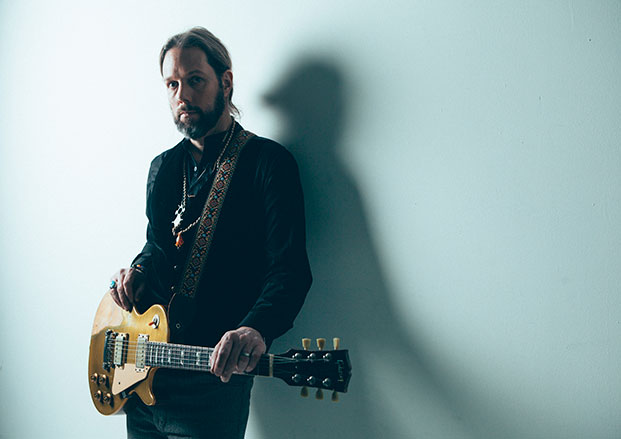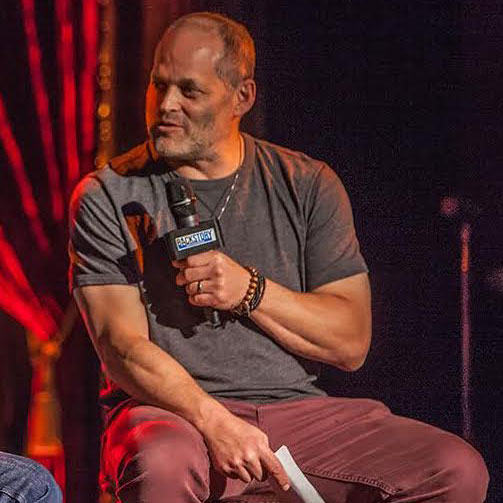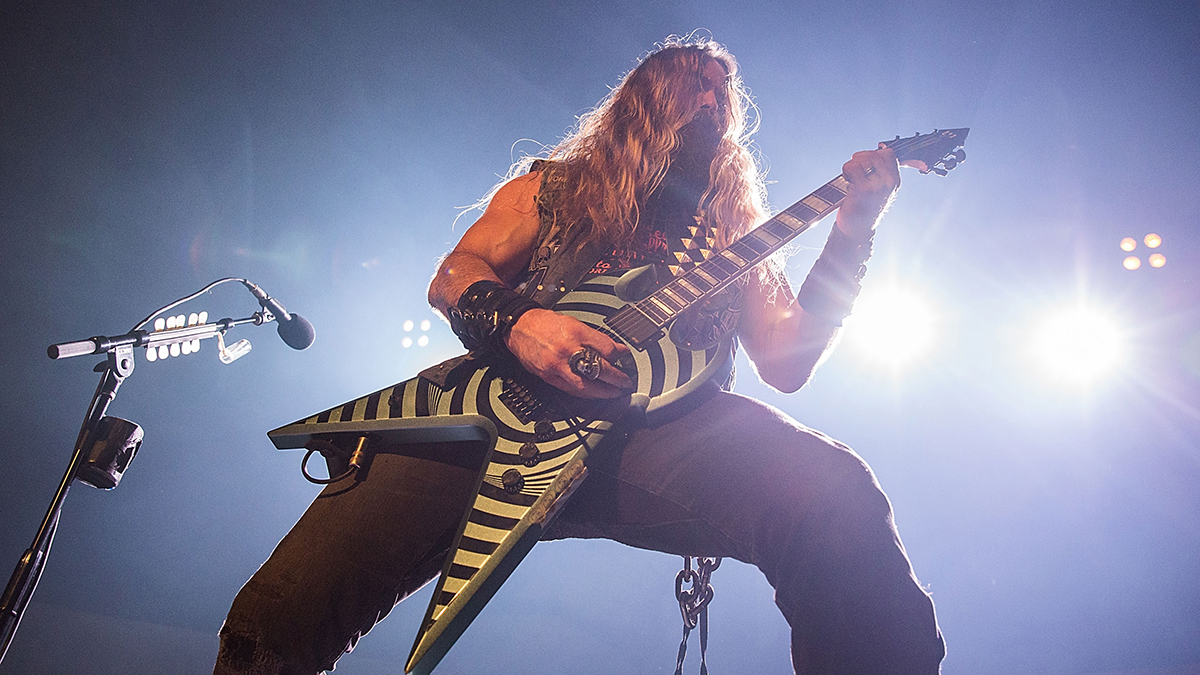All the latest guitar news, interviews, lessons, reviews, deals and more, direct to your inbox!
You are now subscribed
Your newsletter sign-up was successful

When Hurricane Sandy flooded the Black Crowes’ storage space in 2012, a lot of instruments were damaged. I know your ES-335 was restored quite impeccably but were there any that were damaged beyond repair? Which do you wish you had back the most? —Ron Matthews
I’ve been fortunate to have had a lot of great guitars, but a long time ago I realized that it’s just a piece of wood with strings on it. It’s not the guitar or amp that sounds like me: it’s me that sounds like me. And that’s true for anyone who picks up a guitar, or a paintbrush; they are tools to help you express what’s inside you.
Being a spiritual person, when that flood came, I looked at it as taking away all that negative energy because it wasn’t pleasant being in the Black Crowes. It was hard, always. It was hard with some sprinkled moments of positivity. Being in the band was incredibly difficult and negative and it wore me down—and it wore everyone down, so when that flood came, I almost felt relief. We did one more tour after that and it was a lot more positive; 2013 was the best, least contentious one I had been on in years.
Fans were really disappointed that the Crowes just ended without even going out on a final tour. Do you understand that? —Jimmy Solomon
Of course. The audience has a vested interest, but the band does too, and a lot of times bands just can’t continue on. It’s tough being in a marriage of five or six dudes for 25 years, from both a psychological and a creative standpoint. Think of what you go through in a marriage: ups and downs, children, financial issues—just life coming your way. It becomes exponentially more complicated when there’s a bunch of other people and it hangs on a skeleton that’s not necessarily that strong. It can be emotionally exhausting.
I’m very proud of that band and the music my brother [singer Chris Robinson] and I played together. We toured with every one of our heroes except the Beatles! And to be around for 24 years and to have the response to our music that our fans gave us is incredibly gratifying. People would come see us and get out of our music what I used to get out of the Stones and Nick Drake and Led Zeppelin. You could see it and feel this love for what we did and there’s no greater gift on earth than that as a creative person. That’s a beautiful thing but every day was hard. I truly believe we should have done something better than we did to end—for the fans not for us—even is it was just one final run somewhere. It would have been a far cooler thing to do than to have it just end.
Steve [Gorman, Black Crowes drummer] has said that a 25th anniversary tour was planned. Is that true? —Greg Sells
All the latest guitar news, interviews, lessons, reviews, deals and more, direct to your inbox!
Absolutely! We had planned it throughout all of 2013 and were talking about having someone do a movie and tell our story right. Not doing it was not Steve’s or my decision. It was 100 percent Chris’ decision.
Would you ever collaborate with ex-Crowes like Marc Ford, Steve Gorman, Eddie Harsch or Sven Pipien again on anything? —Andy Shope
You never know. I like all those guys. I’m a huge fan of Ed’s as a musician and a person and have tried to have him come down to play with him several times, but it’s never panned out. I’m always up for working with Sven, who is one of the best bass players in the world. It’s a real blessing in one’s life to be able to play with musicians you have a connection with like I do with Sven and Ed. Steve and I talk semi regularly, but he’s busy. I haven’t spoken to Marc in a few years but he’s a great guitar player who played great stuff on my music. I think we had a very real connection and I would certainly be up for playing with him again some time.
How did you become so creative with open G tuning and move away from the well-known Rolling Stones type patterns to make new, original music? Were there any other important influences? —Ken Graydon
My dad was a huge Crosby, Stills & Nash fan and they are some of my earliest musical memories. Of course I didn’t understand they were alternate tunings, but I loved the sound of Stills’ guitar. A friend gave me a Nick Drake record and I was so drawn to the tone and timbre of his guitar and that became my biggest influence in terms of tunings. Then, as I got into blues, I was drawn to country blues like Mississippi Fred McDowell and Furry Lewis—a lot of open D and G, which was a common theme in what I was listening to. As I started getting into that tuning, I started seeing the chords you manipulate and that was what drew a feeling out of me. All those strings resonating together created a symphony of microtones.
You have a new solo album and are also re-releasing your first four records with new material. What’s that all about? —Ben Oppenheimer
Now that the Black Crowes are finally done for good, it was a good time to take stock and I just wanted all my solo records under one roof and to have them all the way I wanted them. I never liked the sound of Paper, which was my first solo album. I had wanted to remix it for a long time. The flood also damaged all these tapes. We had to dry out the two-inch masters and all the vocals were lost, which gave me an opportunity to sing them all again and to add songs I had never finished, to basically create a new record. It was really cool—something musicians often desire but rarely have a chance to actually do.
Who are your main slide guitar influences? —Jon Dizzle
Keith Richards and Duane Allman go without saying. I love Ron Wood’s slide playing in the Faces. One of my favorites is Ry Cooder, especially tonally. Mississippi Fred McDowell is one of my favorites; his slide is biting and crazy. I love the melodic choices Jimmy Page made on slide; it was very compositional. And Derek Trucks is just mind-blowing and is such a cool dude.
Thank you for doing the concerts at New York’s Beacon Theatre after 9/11. They really meant a lot to many of us. The Crowes were on the verge of a long hiatus but the music was stellar. Did you feel the power? —Thomas Marshall
I appreciate that. Yes. The whole run was very emotional in the middle of a horrifying and bizarre time. We cancelled one show in California then decided to carry on. People needed something. We donated all the Beacon profits to a 9/11 fund. By the way, we didn’t know we were going to break up; Chris announced it to us after the end of the tour. He thought we were holding him back and he could be bigger without us.
There were a lot of second guitarists in the Crowes. Could you say something about each? —Laura Benson
It was a bummer that we kept switching members but shit got in the way and it always sucked losing a guy. I thought Marc was a great guitar player, then Audley Freed, Luther Dickinson, Paul Stacey for a minute and Jackie Greene on the last tour. At some point it got silly, like can we just hold on to someone? I would have preferred to grow and be a band for a longer amount of time but you can’t discount injecting new energy into something as well. I was skeptical of Jackie because I knew him more as a great songwriter, but he came in very respectfully and I thought did a great job.
I was amazed by how well you guys blended with Jimmy Page in 1999. Was it difficult? —Scott Marsh
- It was easy because we have the utmost respect for Jimmy and his music and a pretty deep knowledge of where Jimmy came from. Audley did a great job picking apart the songs and making sure we nailed every part on the records. We rehearsed hard for two weeks before Jimmy walked in. We were such a strong band that we could really give him something to work with.
- One of our first big arena tours was opening for Robert Plant in 1990. He was just great to us. When Page and Plant got back together they offered us some shows. One of the coolest things ever came when we were touring with the Stones and on the days off we would play with Page and Plant, so we can say we were on tour with the Stones and Zeppelin at the same time.
What is your desert island guitar? And what tuning is it in? —Steve Len
I’d probably bring my 1953 Martin D28. If I’m on a desert island I can still tune!
Alan Paul is the author of four books, including Brothers and Sisters: The Allman Brothers Band and the Inside Story of the Album That Defined '70s as well as Texas Flood: The Inside Story of Stevie Ray Vaughan and One Way Out: The Inside Story of the Allman Brothers Band – both of which were both New York Times bestsellers – and Big in China: My Unlikely Adventures Raising a Family, Playing the Blues and Becoming a Star in Beijing, a memoir about raising a family in Beijing and forming a Chinese blues band that toured the nation. He’s been associated with Guitar World for 30 years, serving as managing editor from 1991 to 1996. He plays in two bands: Big in China and Friends of the Brothers (with Guitar World’s Andy Aledort).


